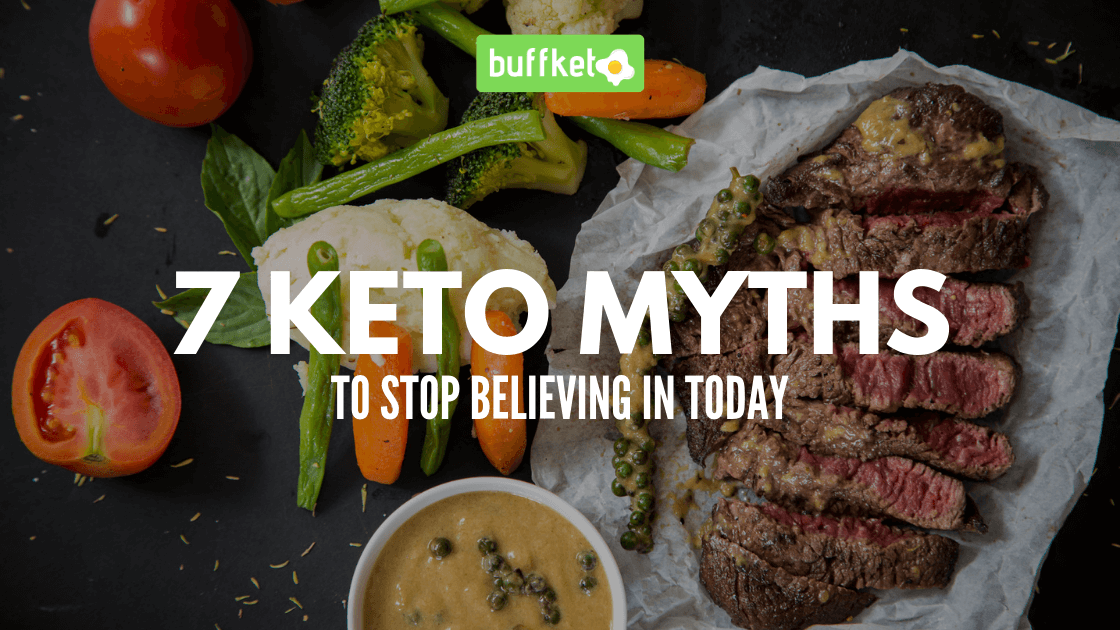The keto diet gets a great deal of press as an effective way to lose weight. Yet, there is considerable bad information out there about the keto diet, as well. Many people believe that staying in ketosis for an extended period of time is bad for health. They also believe that it can be dangerous to cut out carbohydrates and include generous quantities of fats in the diet.
In reality, the keto diet is safe. If you fear that the diet is dangerous in any way, you probably believe in myths to do with the dietary system. What follows is a list of seven common myths about the keto diet, together with information on the real facts.
MYTH #1: The Keto Diet Can Cause Nutritional Deficiencies
The truth is, the keto diet is nutritionally adequate. You only need to practice it the right way.
There are three main requirements involved in getting your body to enter ketosis: you need to lower your carbohydrate intake, limit the amount of protein that you get, and raise your consumption of fat. When you follow these three rules, your body begins to use up fats to fuel itself, rather than use sugars.
Technically, you could get your body to enter ketosis eating nothing other than mayonnaise, margarine, and mutton. You would suffer from terrible nutritional problems, however. Of course, this isn’t the only way to get your body to enter ketosis. You can do it with better nutrition by eating a diet filled with meat and seafood, olive oil and low-starch vegetables.
The bottom line is that it’s possible in the keto diet to supply your body with all the nutrition that it needs. You only need to choose to pack your keto diet with healthy foods.
MYTH #2: The Keto Diet Brings on Ketoacidosis
The truth is unless you have type 1 or type 2 diabetes, ketoacidosis isn’t a possibility you need to worry about.
It’s a misconception that the keto diet causes ketoacidosis. The body cannot enter this state if it produces insulin in a normal way. There is a hormonal signaling system in place that ensures that ketoacidosis is not a possibility. In reality, this misconception only exists because ketoacidosis, the condition, sounds similar to ketosis, the state that the body enters when you’re on the keto diet.
If the ketone levels in your blood go beyond 6 mmol/L, it’s the sign your body looks for to begin releasing insulin. The release of insulin sets other actions in motion. Your lipid cells stop secreting fatty acids, for instance. The liver produces ketones at a slower rate, as well, and the kidneys remove ketones from the bloodstream. As long as your insulin levels are healthy, your body won’t suffer from ketoacidosis.
MYTH #3: You Become Too Dehydrated on the Keto Diet
The truth is, you cannot get dehydrated on the keto diet if you drink a reasonable quantity of water each day, and include electrolytes such as sodium, magnesium, and potassium in your diet.
Without a doubt, the keto diet does flush plenty of water and electrolytes out of the system. It’s easy to replenish your body’s supplies, however, when you get enough water and electrolyte supplements.
MYTH #4: The Keto Diet Puts You at Higher Risk of Heart Disease
The truth is that the keto diet actually helps lower the risk of heart disease.
As long as you choose a healthy keto diet that includes healthy fats, it can only help the heart. A healthy keto diet does this in a few ways.
A study called Long-term effects of a ketogenic diet in obese patients, that followed several dozen study subjects over years, found that the keto diet lowered the body’s levels of triglycerides. The keto diet also helps the body bring down its levels of bad, LDL-cholesterol. A study named A randomized trial of a low-carbohydrate diet for obesity found that the keto diet raised the body’s levels of good, HDL cholesterol, as well.
While many people are fearful that the high levels of fats that keto diets include adversely affect heart health, research shows otherwise. In reality, a healthy keto diet is only good for the heart.
MYTH #5: You Lose Muscle Mass on the Keto Diet
The truth is, there is no direct relationship between the keto diet and loss of muscle. In fact, there are many bodybuilders on the keto diet, who do very well.
It’s important to understand that any weight-loss diet takes a little muscle mass away, along with the fat. A little exercise at the gym is all you need to fight the loss of muscle mass. You benefit both from the exercise and the keto diet.
MYTH #6: The Keto Diet Leads to Gallbladder Stones
The truth is, it is low-fat diets that cause gallstones. The liver produces far more fat-digesting bile than the body can use. The body stores surplus bile, which condenses into gallstones. A regular, low-fat diet, then, can cause gallstones. When you get on a high-fat diet that uses up the bile that the liver produces, it leads to a lowered risk of gallstones.
MYTH #7: THE KETO DIET LEADS TO ADRENAL FATIGUE
The truth is, the keto diet doesn’t cause adrenal fatigue. If you have pre-existing adrenal fatigue, however, the keto diet can be particularly hard on your body.
Adrenal fatigue usually occurs when you go through a great deal of mental or physical stress. You may experience stress from anything from work or relationship issues to exercising too much. While the keto diet can lead to adrenal fatigue, it only happens when you are on a strict, low-calorie diet over a period of months. As long as you consume enough healthy calories, you can’t have adrenal fatigue.
Final Thoughts
How do you sidestep all this misinformation about the keto diet? The answer is, you read up, and keep yourself updated. Eat plenty of green, low-starch vegetables like spinach and kale, make sure that you only eat healthy, natural fats, rather than hydrogenated fats, and keep junk food out of your diet. You’ll find that you stay well-nourished, and on the path toward a healthy body weight.







